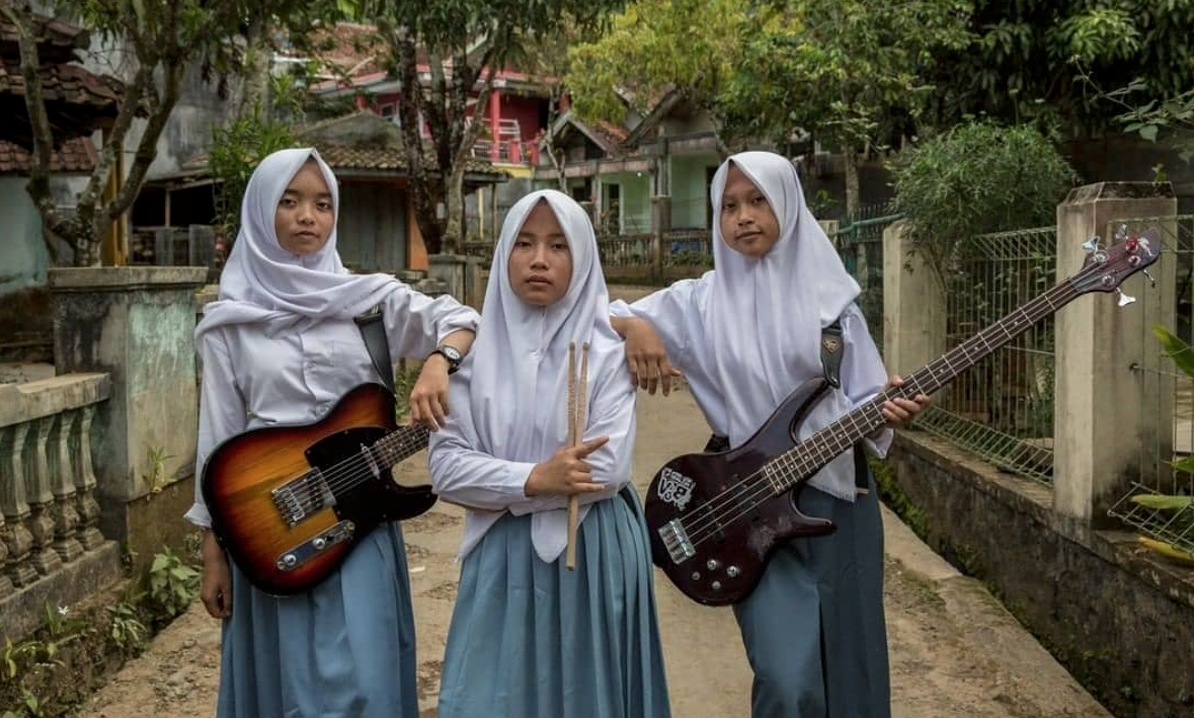Challenging gender roles in Indonesia
Voice of Baceprot

Sassan Tabatabai
The screeching riffs on the electric guitar, the pounding pulse of the bass, and the rolling thunder of the drums suggest that one is listening to the hyper-masculine heavy metal of the 1980s reminiscent of Metalica or Iron Maiden. But as soon as the vocals ring out over the headbanging beat, you realize that you are listening to something very different. This is the sound of Voice of Baceprot (VoB), an all-female heavy metal band from Indonesia. In a Muslim country where women typically don’t enjoy the same freedoms as men, Voice of Baceprot, whose members perform wearing the hijab with black nail polish and leather jackets is an anomaly.
The band was formed in 2014 by a trio of thirteen-year-olds from Singajaya, in Garut, a small village in West Java, Indonesia. Vocalist and guitarist, Firdda Marsya Kurnia, bassist, Widi Rahmawati, and drummer, Euis Siti Aisyah were schoolmates who were brought together by the seemingly far-fetched desire to play heavy metal. In conservative West Java, the trio has had an uphill battle to gain acceptance as an all-female band playing music while wearing the hijab. They have had to face intimidation and threats by conservative elements who see women playing heavy metal as incompatible with Islam. Initially, even their own parents were against the enterprise but over time they have come to embrace their daughters’ desires and talents. Despite the hostile reception by the community, these three musicians have been steadfast in standing by their identity as young women who are practicing Muslims and wear the hijab, but also happen to play heavy metal.
Over the years, Voice of Baceprot has established a foothold in the country’s thriving heavy metal scene and gained in popularity and exposure, both in Indonesia and abroad. Heavy metal is a fast-growing and very popular genre of music in Indonesia. According to the Metal Archives, a website that tries to list all the heavy metal bands in the world, there are 1,500 heavy metal bands in Indonesia. This is an impressive number considering the approximately 270 million population of the country. By comparison, China, which has a population of nearly 1.4 billion, has only 300 heavy metal bands.
Voice of Baceprot has played at some of the biggest venues in Indonesia including “Rock Revolt in Paradise,” in Bali in 2017. In 2021, they took part in the “Women of the World” (WoW) festival. In their introductory comments at WoW, they singled out their native village as a place that has helped the band shape their understanding about themselves as women and as human beings. Speaking on behalf of the trio, “every dream that we have,” said Firdda, “should be fought for and achieved including our hopes and dreams on equality, be it in terms of gender or as human beings.”
Many of Voice of Baceprot’s songs embody a social consciousness and express issues that are important to the band, like gender equality, care for the environment, and educational reform. Their most well-known song, “School Revolution,” has had over 740,000 views on YouTube. The song’s lyrics, which are sung in both English and Sundanese (a Javan language) address inequality of access to education. According to the band, “its lyrics describe our yearnings and aspirations for a change in our education system, which from our point of view has not been implemented equally for each individual.”
Voice of Baceprot has over 47,000 followers on Instagram and 13,000 followers on Twitter.
SASSAN TABATABAI is Guest Editor of Mizan Pop.


